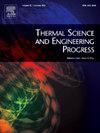Performance investigation of geothermal driven organic Rankine cycles with zeotropic mixtures and partial evaporation
IF 5.1
3区 工程技术
Q2 ENERGY & FUELS
引用次数: 0
Abstract
Geothermal heat is a promising option for renewable energy generation, and the Organic Rankine Cycle (ORC) effectively converts this heat into electricity. Current research focuses on replacing high-GWP (Global Warming Potential) working fluids with more environmentally friendly alternatives and incorporating strategies to enhance efficiency. Building on these goals, this study examines low-GWP hydrocarbon working fluids and their binary zeotropic mixtures under partial evaporation. Using a validated MATLAB code integrated with the CoolProp tool, six working fluids—hexane, pentane, isopentane, butane, isobutene, and propane—were simulated, and their vapor quality was optimized for different source temperatures. Subsequently, binary zeotropic mixtures composed of these fluids were optimized for mixture composition and vapor quality, and the resulting systems were compared. The final results identify the optimal pure fluid and mixture option for each examined geothermal source temperature, serving as a performance map for geothermal ORC applications. The results showed that incorporating zeotropic mixtures as working fluids enhances system efficiency across all examined source temperatures compared to optimized pure fluids, with an increase reaching 40 % at low source temperatures. The economic evaluation indicated a decrease in the payback period and an increase in NPV for systems using zeotropic mixtures compared to pure fluids; the respective values ranged from 2.2 to 10 years and 47.1 k€ to 3,292.4 k€. Overall, geothermal ORC with zeotropic mixtures was found to outperform pure fluids in both thermodynamic and economic performance.
求助全文
约1分钟内获得全文
求助全文
来源期刊

Thermal Science and Engineering Progress
Chemical Engineering-Fluid Flow and Transfer Processes
CiteScore
7.20
自引率
10.40%
发文量
327
审稿时长
41 days
期刊介绍:
Thermal Science and Engineering Progress (TSEP) publishes original, high-quality research articles that span activities ranging from fundamental scientific research and discussion of the more controversial thermodynamic theories, to developments in thermal engineering that are in many instances examples of the way scientists and engineers are addressing the challenges facing a growing population – smart cities and global warming – maximising thermodynamic efficiencies and minimising all heat losses. It is intended that these will be of current relevance and interest to industry, academia and other practitioners. It is evident that many specialised journals in thermal and, to some extent, in fluid disciplines tend to focus on topics that can be classified as fundamental in nature, or are ‘applied’ and near-market. Thermal Science and Engineering Progress will bridge the gap between these two areas, allowing authors to make an easy choice, should they or a journal editor feel that their papers are ‘out of scope’ when considering other journals. The range of topics covered by Thermal Science and Engineering Progress addresses the rapid rate of development being made in thermal transfer processes as they affect traditional fields, and important growth in the topical research areas of aerospace, thermal biological and medical systems, electronics and nano-technologies, renewable energy systems, food production (including agriculture), and the need to minimise man-made thermal impacts on climate change. Review articles on appropriate topics for TSEP are encouraged, although until TSEP is fully established, these will be limited in number. Before submitting such articles, please contact one of the Editors, or a member of the Editorial Advisory Board with an outline of your proposal and your expertise in the area of your review.
 求助内容:
求助内容: 应助结果提醒方式:
应助结果提醒方式:


